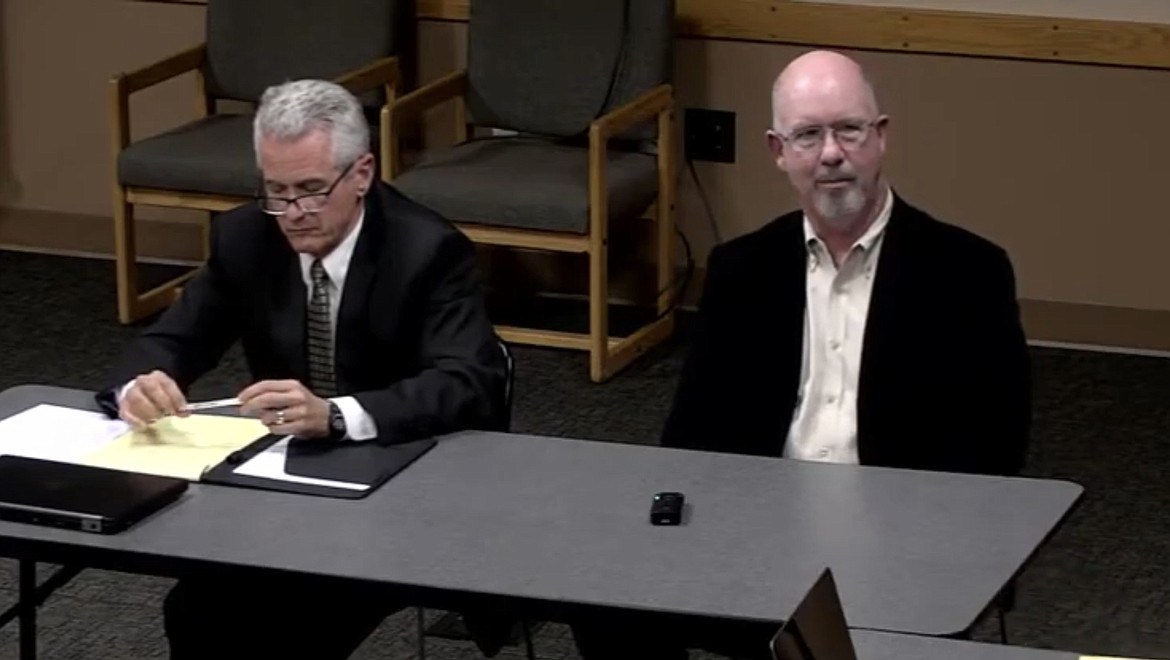Prosecutor, coroner share views on county government structure
MADISON HARDY | Hagadone News Network | UPDATED 4 years, 4 months AGO
COEUR d'ALENE — Suppose you're a 21-year-old U.S. citizen who has lived in Kootenai County for 365 days.
In that case, you have all the statutory qualifications to be elected sheriff, coroner, clerk, treasurer and assessor.
Still, county Coroner Warren Keene told the Optional Forms of Government study commission Tuesday night that making his office a hired position wouldn't guarantee more qualified candidates.
"People can look really good on paper and not be that great of an individual," Keene said.
The OFG commission is tasked with evaluating the operational efficiency of Kootenai County government when serving constituents. Through investigation, study members will compare their findings to structures permitted under Idaho Code 31-5001 to determine if another form of government would better benefit the community.
As coroner, Keene's responsibilities include:
• Cremation approval
• Determining the manner and cause of death for individuals unattended by medical personnel during their last illness
Keene spent 40 years practicing medicine before entering office in 2015 — an experience not required for his elected role. Of the 44 Idaho county coroners, Keene said two or three are physicians. The others are mostly funeral directors.
"Fortunately, in Kootenai County, we've been blessed by having physicians being the coroner for almost the majority of the last 70 years," Keene said.
Keene's medical background benefits not only him but the taxpayers, he said, by keeping his expenses low. To stay within the department's $157,000 budget, Keene said he performs autopsy investigations exclusively when necessary.
Autopsies cost upward of $3,000 per body, Keene said, adding that the county could face a $1 million bill if he were to autopsy each body brought to the department.
"If you wanted someone who did not have my background, you would be subjecting the taxpayer to a much higher bill," Keene said. "I'm glad to be able to return some money every year to the budget. My predecessor wasn't able to do that and was $100,000 over budget in the first two years of office."
In addition to the other statutory qualifications for elected officials, county prosecuting attorneys are required to be licensed to practice within the state of Idaho. Kootenai County Prosecuting Attorney Barry McHugh, who was also interviewed by the OFG commission Tuesday night, said his direct accountability to voters has influenced every action since taking office in 2009.
"It certainly weighs on me when making decisions about my office, especially in the criminal division," McHugh said. "It's a pretty easy task from a moral and ethical point of view in that our job is to do the right thing — prosecute cases and keep the community safe."
McHugh expressed his belief that the board of commissioners acting as his supervisor is "inherently an issue" considering his office provides them legal counsel. However, if the board hired the prosecuting attorney, McHugh said it would put that person's ability to be objective in question.
"If my position was hired, I don't think I would be as directly accountable to the citizens as I am right now — not to say if it was me that I wouldn't certainly try to be," he said.
Study member Brian Cleary asked McHugh if expanding the number of commissioners — thereby allowing a minority to communicate outside public meetings — could violate the Public Meeting Law and risk backroom lobbying.
McHugh said communications informational in nature would be permitted, but deliberations on an issue pending board approval would still be prohibited.
"The concept of the Public Meeting Law is to make sure decisions are made with full knowledge of the public," he explained. "I don't think that a greater number of people should allow for discussion related to deliberation, decision making, or collaboration with people on the side."
In advance of his meeting with the OFG next Wednesday, Sheriff Bob Norris issued a statement expressing his opposition to any change that might be recommended by the study commission.
Through a press release posted on the Kootenai County Sheriff's Office Facebook page Wednesday morning, Norris stated a change to the existing government structure is "simply a power shift away from the people to the (board of county commissioners) and an unelected bureaucracy."
"Elected Offices have served the people of this great county well for over a century," Norris' statement reads. "The checks and balances between the elected positions are an example of a working system."
ARTICLES BY MADISON HARDY

CDA Tribe challenges redistricting
Says 'communities of interest' not served in new map
Coeur d'Alene and Shoshone-Bannock tribal leaders file suit against legislative boundaries

CDA Tribe challenges redistricting
Says 'communities of interest' not served in new map
Coeur d'Alene and Shoshone-Bannock tribal leaders file suit against legislative boundaries

CDA Tribe challenges redistricting
Says 'communities of interest' not served in new map
Coeur d'Alene and Shoshone-Bannock tribal leaders file suit against legislative boundaries

